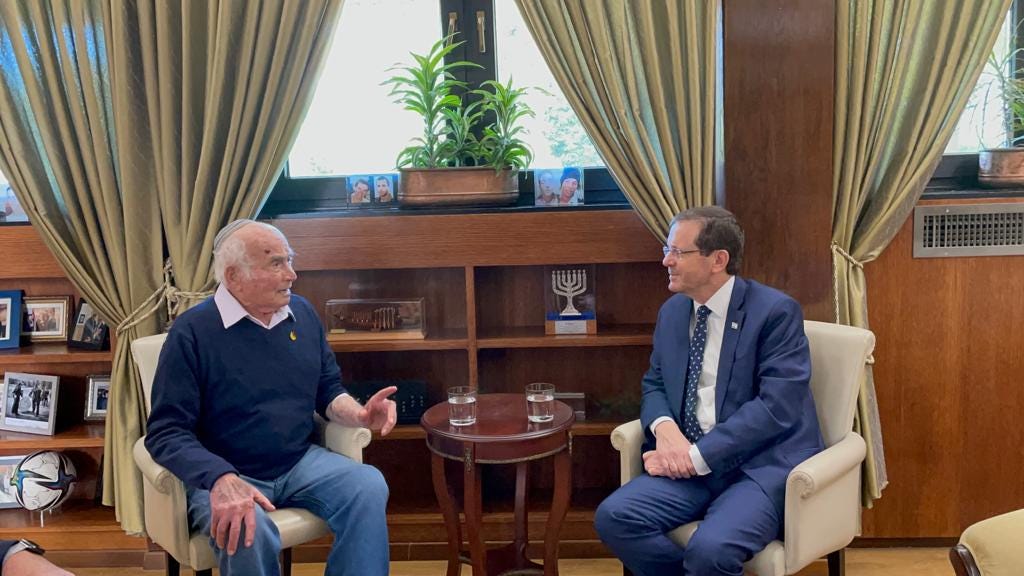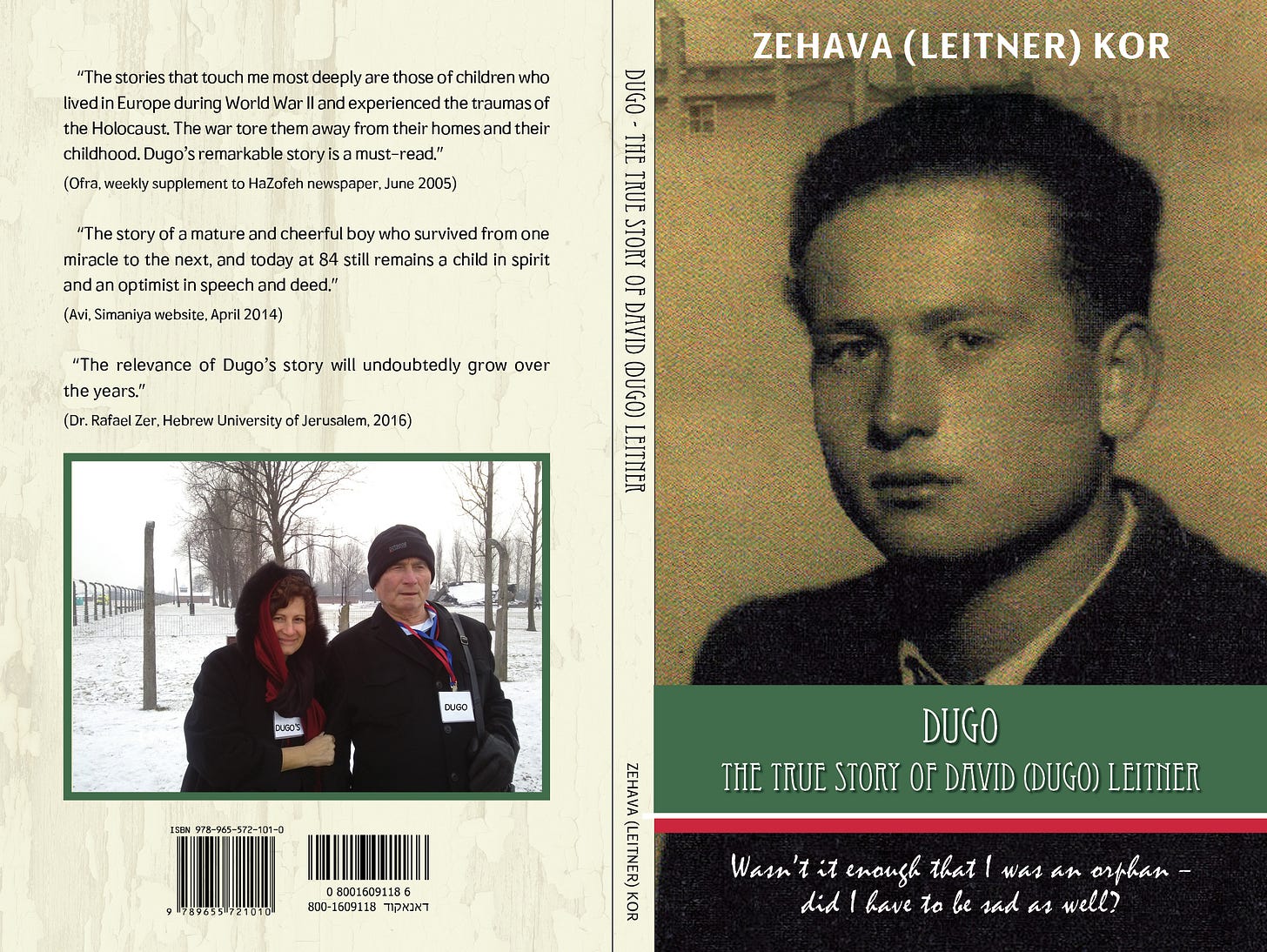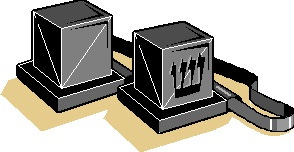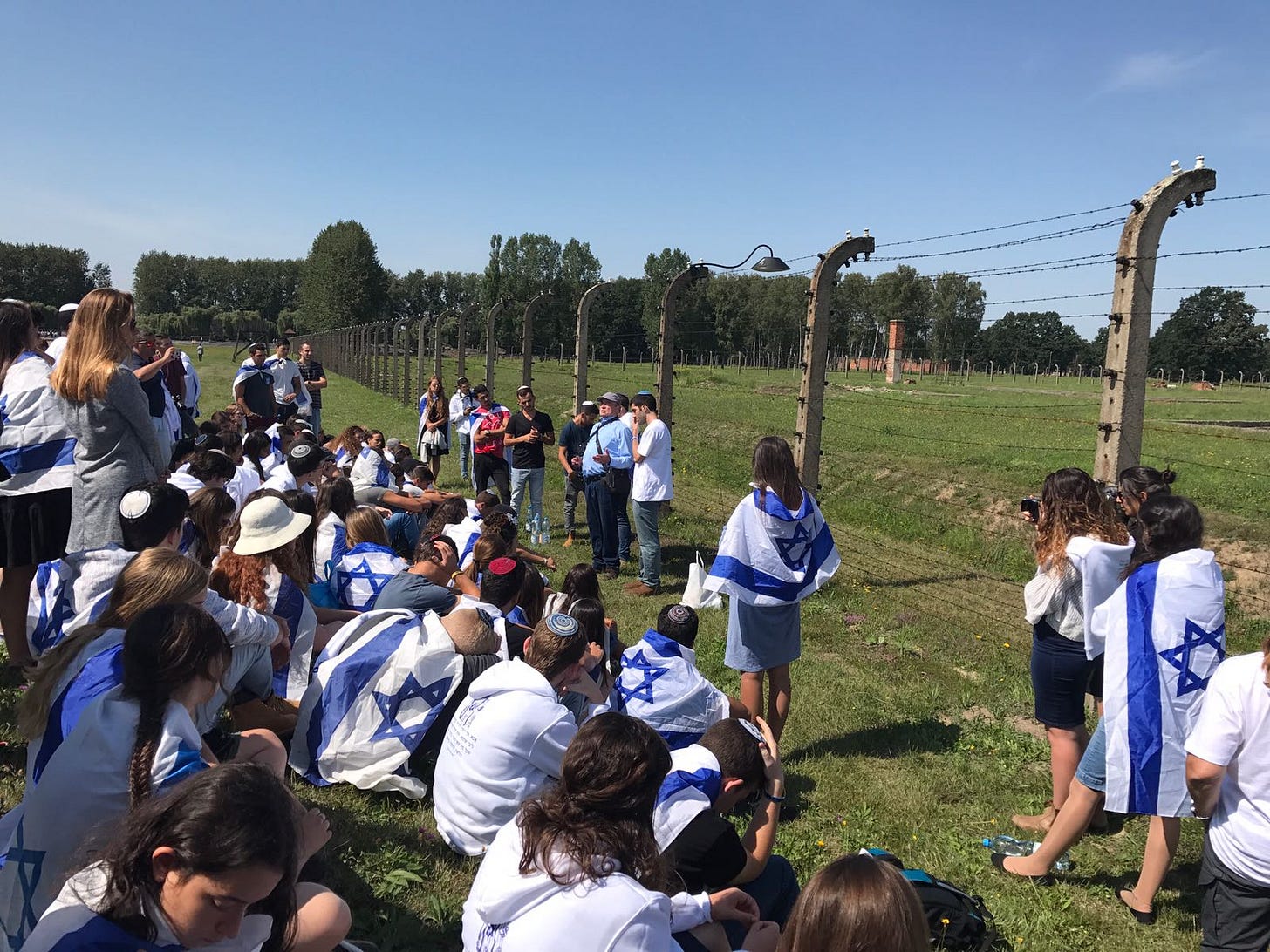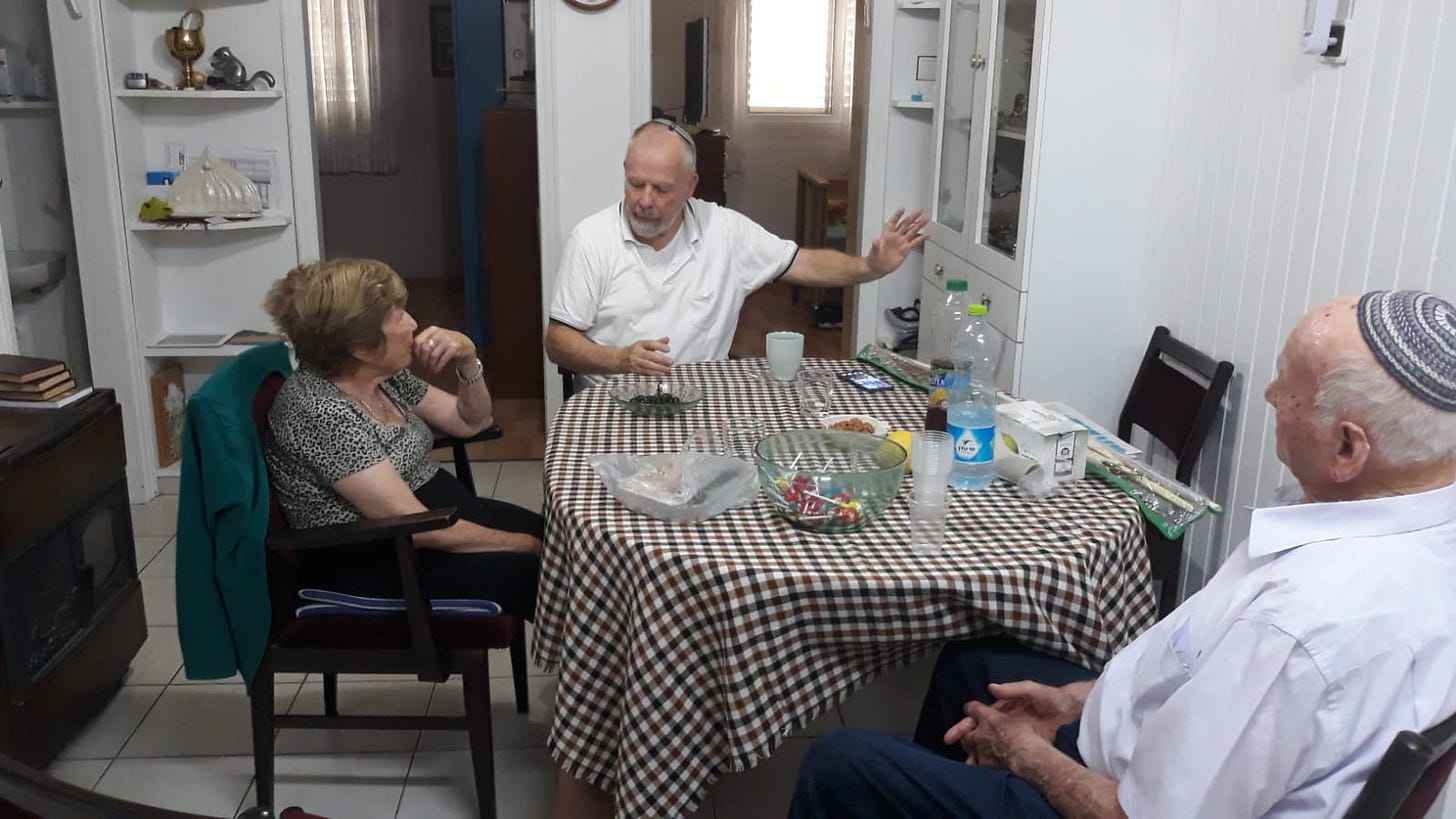Against Antisemitism--Revisited
What a difference a year makes
The following article was written in January of 2023. It was the second article that I wrote in reaction to an upsurge in Antisemitism in the USA and elsewhere (I am also republishing the first article). Since the attacks of October 7th and the strident anti-Israel protests, I am re-publishing it again. I seem not to have overdone it after all, but you the reader can be the judge of that. I have added some notes to the end in italics.
There is an unprecedented propagation of Antisemitism online. There are not enough Jews in existence to combat this. The Jews of Hollywood, the Zionist Jews, the Jews of Wall Street, the Jews of the Banks, the Jews of the Media, Jewish landlords all the way down to the Jew that owns the local grocery, and if it were possible, all the Jews murdered by Antisemites through the ages—all of them together would not be able to stop the online resurgence of this ancient but timeless hatred, in part because what we see online is just a sprinkling. Below the surface, aching to be expressed, is a giant caldera of boiling Jew-hatred. The Jewish institutions fighting Antisemitism are like that huge side of earth on Mt. Saint Helens that held back the eruption. At some point that slab of earth will slide down into the valley and Heaven help the Jews then.
If it were not so evil, it would be fascinating to watch. That is what captivates the audience. The outrageousness of the spectacle. That poke in the eye of moral sensibilities, the “brave” iconoclast shouting maniacally on a podcast, urges a gut-chuckle out of us, but soon enough it all morphs into semi-military, black-uniformed thugs marching in the streets of the New York city shouting in unison: “we are the real Jews!” This is the play-acting of the extermination of the Jews by usurping their identity. Training for the real thing: the knocking on the doors of Jewish homes in the middle of the night.
This outburst of Jew-Hatred has for the moment hijacked “A Pisgah Site.” The fear of what is coming down the line for American Jews makes me sick to my stomach. I hate to say this, but our beloved American Jewish brethren are coming to the shoot-out armed with tweets. An army of talking heads. Think Alan Dershowitz. They will win every single argument and every court case but (God forbid) are doomed to fail in battle because they cannot understand what is happening, because they are mostly liberal and progressive. If they were not, they would have a simple solution at hand: weapon up. Try and picture it: Alan Dershowitz and Jonathan Greenblatt patrolling Jewish neighborhoods with shotguns. That’s what I mean; it’s not going to happen unless it happens too late. American Jewry, having wandered far from the traditions of their forefathers, re-established its identity as Guardians of the Memory of the Holocaust. As long as that identity was successful in keeping Jews in the fold, then there was value to it. It was successful for about one generation. Now it is disintegrating before our very eyes. Jew haters of course are Holocaust deniers, and their numbers are increasing. Most disheartening of all, young Jews do not buy into the Holocaust-based identity anymore. With no Jewish tradition and no Holocaust burden, they are a true Lost Jewish Generation.
There is one hope for American Jewry, and that is to immigrate to Israel, all 7-8 million. It can be done under duress within two years, with planning and proper management within five years. The money spent on fighting Antisemitism would be more than enough to assist in emigration to Israel. America will do fine without her Jews. America will not do fine if her Jews are abandoned to a violent end.
A Testimony--The Story of Dugo
Holocaust literature is vast and one of the main branches of it is survivors’ stories written by survivors’ children. It is a world of heartbreak and as much as we feel sorrow and sympathy for the survivor, we feel also for the author/child, mapping out that bleakest of landscapes out of love for a parent, while living in a world that is moving on from the European slaughterhouse. These are torn souls and in many of their books they detail the atrocities in a well-deserved gesture of “rubbing our faces” in the reality that was forced upon the Jews. That is understandable but it is literature that is today unreadable, and more so every day that passes. I am speaking as a Jew. Even more so for Decent Gentiles. Does that mean that the story will cease to be told? In that form, yes. And with this awakening, again, of Antisemitism I called the grandfather of my daughter-in-law, David Leitner, a survivor of Auschwitz and two death marches at the ripe age of fourteen. I didn’t know what I wanted, but I felt a need to speak with him. He was happy to oblige, and I packed up my recording equipment and met him in his home. He started talking as soon as I sat down and soon enough, I abandoned the idea of recording our interview. I was not about to interrupt this voice. I had a list of questions that I also abandoned right at the start. I looked at this beautiful man talking about the ugliest subject matter imaginable and the only question that I dared ask when the opportunity presented itself was one that I had not included in my list. When and where did you see the first ray of light, feel that the worst was over, that you might survive? He looked straight at me and said: “I never lost hope. I came close near the end, when I was a breath away from dying, but I held on.”
Dugo’s daughter Zehava Leitner Kor has written a book about her father. It is readable, originally for young adults (though I at 65 read it in one sitting a couple of years ago). It will take you close enough to the black maw of the death camps but will just give you glimpses over the edge. Like I said, readable.
Dugo told me a story that appears in the book, but it was different in his telling of it that day in his home. Fifteen years have passed since the book was written, and he is well into his nineties today. Listen to him.
“The hardest times, the lowest times, the times when I was closest to death were when we reached the end of the death marches. After the first one, when we had reached Mauthausen, I felt that I was at the end of the line. We had been forced to march for three days in blinding snow, rain, and…anyone who stopped along the way was shot where he fell. I was fourteen years old. After a few days, a group of Hungarian Jews who had been with the forced labor brigades arrived, starving. I went over to see if there was anyone that I knew in the group. They did not believe us when we told them about the death camp. That hurt us deeply. But miracle of miracles, my father’s brother, my uncle, was in the group. He was starving too, and weak. He looked at me and said: ‘Dugo, what happened to your pants?’ My pants were in tatters, I was completely exposed. And it was the last thing on my mind. When you are starving you are not thinking about fashion. ‘Dugo, I have tefillin (phylacteries-e.n.), come back in the morning and I will find you some pants so that you can put on tefillin.’ I could only look him in the eye and say weakly: ‘Uncle.’ I turned and left him without saying goodbye.”
“I had looked upon my uncle with disdain. He had no idea what I had been through. All he could see was that I was naked and because of that I could not don the tefillin. For me that was complete insanity. That night, I thought of him. What had he seen? He could see that I was starving; he himself was starving. So, what had he seen when he looked at me? Suddenly, like on a moon-lit night when the snow stops falling, it became clear. He had looked at me when I was at the lowest point in my life, crazy from starvation, not even one step from oblivion, and he had seen a Jew still obligated to observe the commandment of donning tefillin:
I was not yet nothing. I was still a Jew. A Jew without pants, but still a Jew. I was not a model Jew growing up as you know but I never wanted to observe that commandment more than at that moment. I wanted to put on tefillin at once. I was tortured that I had to wait until morning, and I was overcome with regret for being disrespectful to my uncle.
The next morning? No tefillin, no uncle. It’s in the book.” I sat in silence listening to his silence. Then he continued.
“Pants. My survival came down to a pair of pants. By the time we finished the second death march I spent my days sitting in mud. I was out of my mind at this point. The closer the Allies came towards us, the deeper I sank. The approaching artillery fire, the planes overhead—it all barely registered with me. The pants I wore? Air. Nothing. I was listless, dying in the field where we sat, like all those around me, when the rumor started that the guards were going to distribute food. We pushed towards the storage huts as one, out of control, and were rewarded with being shot at. I discovered that I was still able to run. I ran back to my mud pit and this time fell into my deepest despair. To come this far, to have food dangled in front of us only to have to run from guards shooting at us. I had had enough. The new rumor was that if we stood in line without shoving, the food would be distributed the next day. I did not believe it, and even if I did, I did not care anymore. But that night, in my deepest despair, my father’s voice came to me. He didn’t tell me to be strong and of good faith. He didn’t tell me to hold on just a little more. His voice simply said: ‘Dugo, find some pants to cover yourself.’ I did, and it was incredible. I felt a little warmth. That’s it. They warmed me up a little, and that was enough to get me to the line the next day, and to get food and to get away before the inevitable mob-rush began. They did shoot at us again, but I was far out of range, eating already. That is how I survived. It’s in the book.”
For years when he had led school groups to Auschwitz to tell them about the Holocaust, the low point of his story was when he had been thrown into a gas chamber full of children, had cried like them for his parents, had said Shema Yisrael, and at the last minute the door opened and he was pulled out along with fifty other larger boys to do some work that had popped up. He was out, the door closed again, the crying began again, and then it stopped. He had been that close to going the way of all Jews in Birkenau. I had heard that story before at some public appearance of his in the past and I had read of it in his book, and it is the story I had been expecting to hear now. He was looking at me to see if I had absorbed what he was telling me.
Like he said, I had read the account in his book, but he was seeing his own story differently now. He wanted me to understand. Right then I could not see it, but I did feel a profundity.
The covering of one’s privates suggests the story of Adam and Eve.
Traditional Jewish commentary says that because they sinned, they were deprived of their closeness to God. Their eyes were opened to a far different reality, the reality that churns around the organs below the waist. No one had told them that they were naked as they scampered to cover themselves with fig leaves. They simply knew, as we know of ourselves today.
He wanted me to understand the significance of a pair of pants in that hell. Pants the wearing of which at his uncle’s behest would have brought him closer to his Creator, in that it he would be fit to keep the commandment of tefillin. Pants, the wearing of which at his father’s behest, would bring him that tiny measure of warmth that would keep him alive. Dugo had been speaking for a long time. He sat patiently with his wife Sara, inviting me to say something. He was asking me if I understood the significance of his Parable of the Trousers.
The interview took place during the holiday of Sukkot. (You may notice the four species on the table that Dugo had prayed with that morning). Whenever a Holocaust survivor gives testimony (and if you think about it everything they say is testimony) there is, beyond the words, a silence that is present. It is almost a physical presence, and it is the silence of those Jews who did not survive. In Jewish folklore the four species represent four categories of Jews, from the holiest represented by the citron to the lowliest represented by the willow branches. When the species are held together and waved during the morning prayers of Sukkot, it symbolizes the unification of all Jews, that the People of Israel include all types. There is a Divine Directive of Unity in Judaism that proclaims that the Divine Plan for the World will come to fruition on the condition that the People of Israel are united. The Creator’s deal is with the entire people; less than that and there is no deal. When Holocaust survivors wave the four species, they are heeding the Unity Directive, but they are also heeding the Directive of the Perished, shared only by those who were there, and invoked by the silence between and behind and beyond words, the silence of the perished, and the silence of the Holy Abode in those dark times.
Subject matter such as this takes time to sink in. I had come to Sara and Dugo that day with a self-imposed mandate to gather ammunition to fire back at the flurry of Antisemitism on the internet. I would approach Dugo’s story from a new angle and would scribble my way to clarity, and publish it here, for all the world to see, and to be convinced. I looked at Dugo and saw myself in his eyes. Stark recognition. He had seen and heard from the likes of me many times over the years. I sensed—not for the first time while speaking to a survivor—an expectancy in the air. An expectancy that the testimony of their lives will be understood and will help bring the world to a better place, a place that among other things would be safe for Jews. On that day, after all these years, a proud Jew living in the Jewish homeland, he hinted that considering the resurgence of Antisemitism in of all places the United States of America and considering the world’s complacency towards Iran’s half century of dedicating itself to Israel’s destruction, it might be possible that his optimism was finally growing old. That a darker view of mankind was more appropriate. I did what I could to be upbeat. This took place during Sukkot as I have mentioned, “The Festival of Booths,” during which the Jewish people are commanded to be happy, joyful.
Like the said background silence, a black wall of water hovering above a moment before the deluge, there was background activity in the Garden of Eden:
The tree of life. Living forever. The negation of death. Isn’t this the tree that can hold evil at bay, that can redeem the Silence of the Perished, and not just for Jews, but for all mankind? In Proverbs, this tree is identified:
She is a tree of life to those who lay hold on her: and happy are those who hold her fast. Proverbs 3:18
This verse is said after the reading of the Torah scroll in the synagogue, before returning it to the Holy Ark. The Torah is the tree of life. The final Redemption will be mapped directly to the measure of observance of the statutes and pondering of the wisdom therein. First by the People of Israel in the Land of Israel, as a precursor to the entire world clinging to the Tree of Life. This is happening before us as we read and write. (Translation of the words appear at the end of the video).
Famine and starvation are recurring themes in the Bible. Abraham, promised the Land of Israel and offspring as numerous as the stars, was forced to travel to Egypt because of famine. Joseph solidified his position in Egypt by foreseeing and managing a seven-year famine. This is the sympathetic echo to the promise of the Garden of Eden. Eating the forbidden fruit brought us exile and sustenance hard scratched of the Earth, and sometimes famine. One of the most striking scenes in Dugo’s story was that of the morning he peeked out of the barracks at Gunskirchen camp that was situated in a forest among the trees:
“…all the trees in the forest had been stripped. People were so hungry that they ate not only the leaves that had begun to sprout after the snow melted, but the bark on the trunks as well.”
A hard scratched tree of life if you will. Eating as seminal human activity. From eating the forbidden fruit to eating the bark from trees the human hand reaches for nourishment regardless of the vast distance between the life promised and the life lived. There is a touch of Eden in picking and eating the fruit of trees. Even the thought of such nourishes our souls. The end of the Story of Dugo is testimony to this.
"… Yes, I will end this story by talking about food. After the war we learned three things very quickly: almost no one wanted to hear our stories and of those that did, most did not believe what we told them and even if someone listened with a sympathetic ear, there was no way that they could understand what they heard. Remember my Uncle who was himself starving but still did not believe what I told him about death camp Birkenau. So, we didn’t talk. We ate. Having food to eat was a miracle. And though we didn’t talk we remembered. All the time. I held close to myself the memory of those who fell by the way on the death marches. One moment marching beside me, the next moment their place taken by a puff of snow swirling in the empty space where once scuffled along a breathing Jew. I decided to have my own memorial day for those lost Jewish souls. I fixed the date to January 18th, the day that the death march from Auschwitz-Birkenau began. That would be the day, and on that day I would eat. I would eat for them and for myself until I could eat no more. But what would I eat? Did it matter? Should I eat bark from a tree? No, that was not right. I felt it would come to me and in time, it did. Since my father first commanded me, I still would say Psalm 20 “For the Conductor, A Song of David” whenever I found myself in a jam. In the third verse, “strength” or “support” comes to the supplicant from Zion. That word in Hebrew can mean sustenance, food. A suitable food for my memorial day had to be Israeli, had to come from Zion! In our home in Nyiregyhaza my dear mother of blessed memory would tell us wonderful tales of the Land of Israel. In one story she said: “You’ll never be hungry in Israel, Dugo. There is a little round muffin called bilkele that grows on trees there and whenever you are hungry you just pick them and pop them in your mouth.” I remembered. That little round bilkele danced in my mind during the hardest parts of the death march, when I had to close my eyes against the cold and against the silenced steps of those who fell by the way. That bilkele, my mother’s story, sustained me.
One day I was walking through the shuk in Mahane Yehuda in Jerusalem, and I imagined I was seeing little round bilkeles flying through the air and landing in pita bread. I then knew what a bilkele was. It was a felafel. True, felafel doesn’t grow on trees, but they were round and tasty, and you could get felafel anywhere in Israel. My memorial day would be January 18th and on that day I would eat felafel. It didn’t hurt that I happened to like felafel and when I started I was young and could eat 3 or 4 portions. After a few years of keeping this memorial on my own my daughters asked to participate. In recent years, the young people at the Testimony House Museum in our town of Nir Galim have taken the tradition on-line, and now each January 18th thousands of Jews from Israel and around the world eat felafel and take pictures of themselves holding a sign reading: “Operation Dugo-The Jewish People Live!” and send the pictures to the Museum’s Facebook page. To end this story, I, Dugo, David Leitner, proclaim to all the world and to the Heavens:
THE JEWISH PEOPLE LIVE AND ARE EATING FELAFEL AND ARE CONTENT!"
The Jews are facing a Virtual Extinction that can only but lead to real Antisemitic violence. This Virtual Extinction has three axioms:
The Jews are not the “real” Jews.
The Holocaust did not occur; six million so-called Jews were not murdered.
The so-called Jews have no claim to Israel.
Virtual Call to Action:
Join the virtual January 18 anniversary, celebrate with us Dugo’s survival and the future of the Jewish people. Eat felafel (or not) and take a selfie holding a sign saying: “Operation Dugo—The Jewish People Live.” Upload to Facebook with hashtag #Operation_Dugo
All of that on-line antisemitic vitriol at the beginning of the year seems so insignificant now, or does it? Can it be a precursor, like the early Nazis singing patriotic and antisemitic songs in the beer halls of Germany before Hitler rose to power? When I wrote about Dugo, who has sadly since passed away, I meant it to be a tribute him and his fellow survivors, and to be a marker to that point in time when the Jews ceased to be victims. Now any mention of the Holocaust—no matter what the context—is thrown back at us with the accusation that the Jews are playing the victim card again, and that by the way, the Jews have lost their claim to prime victimhood now that they have created by their own actions the new Uber-Victim, the Palestinians. The people of Israel are roiling from the tremendous blow thrown at us by our enemies. It was a tremendous blow. Just like the full-blown international support for Hamas even before Israel raised a finger in defense was a tremendous blow and an awful eye-opener for Jews the world over, as was the subsequent doubling-down of that support with claims of Israeli genocide of the Palestinians. The Big Lies, the Doublespeak, all of the rotten rhetorical tools that lead to social disintegration are in play now. First and foremost to prevent Israel from defeating a truly evil enemy, but always with the freely and openly declared ultimate goal of erasing the Jewish State from the map.


